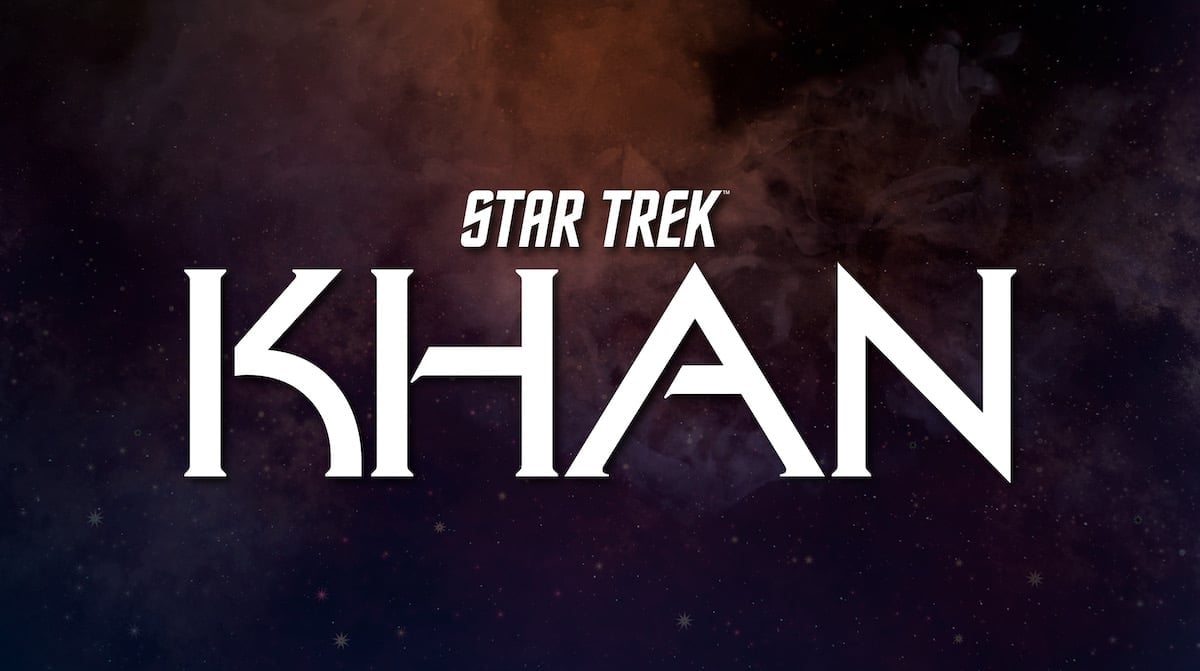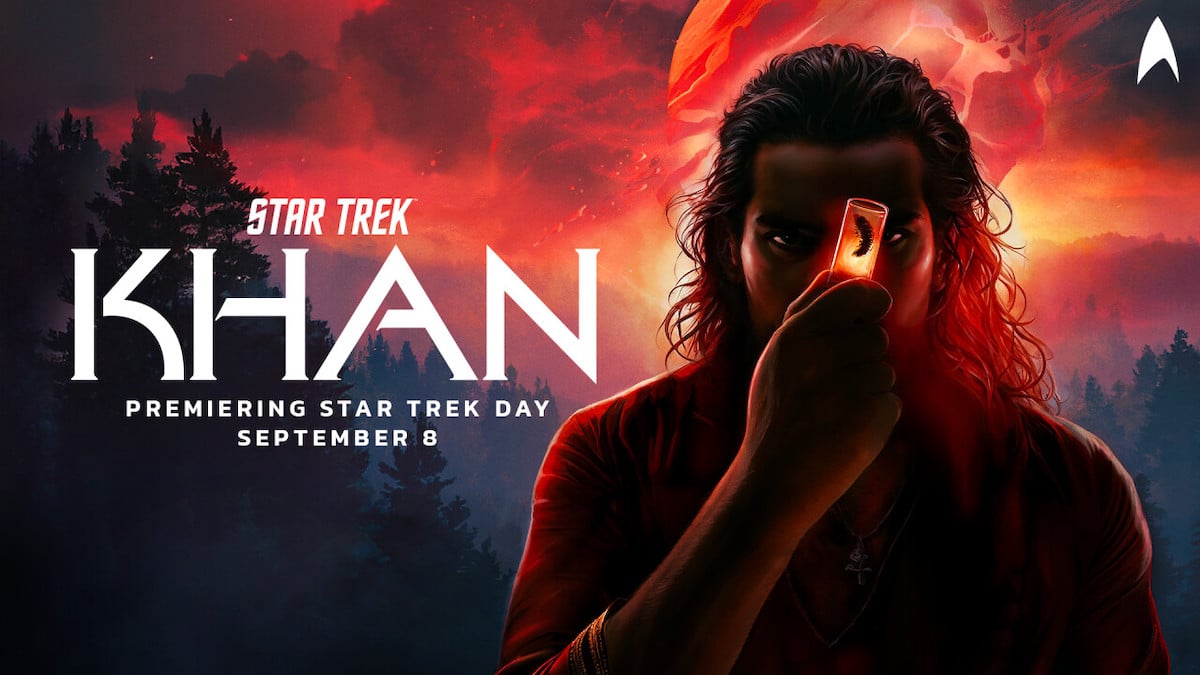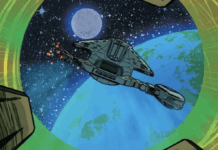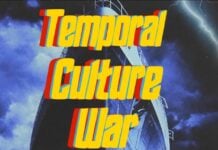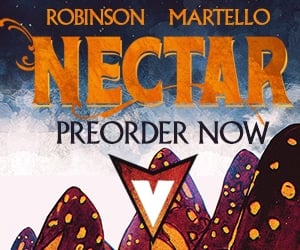In the ongoing podcast Star Trek: Khan, listeners get to discover what happened during the reign of Khan Noonien-Singh (Naveen Andrews) during his time on Ceti Alpha V. Set largely between the Star Trek: The Original Series episode “Space Seed” and Star Trek II: The Wrath of Khan, and also starring Wrenn Schmidt as Marla McGivers, the audio drama series is based on a story by Nicholas Meyer.
After debuting on Star Trek Day (September 8th, 2025) and through November 3rd, 2025, new episodes of Khan are available each Monday wherever you enjoy your podcasts. To celebrate the ongoing story, The Beat caught up with Khan co-composers Marcus Bagala and Sam Bagala over email to learn more about their work on the series’ music.
AVERY KAPLAN: How did you come to be involved in this project?
MARCUS BAGALA: It’s a bit of a long and convoluted story, but the short-ish version is that Sam and I have worked with Fred Greenhalgh, the director, on quite a few projects. When Secret Hideout and Paramount were considering turning Nick’s teleplays into a podcast, there was a series of pitches, and Fred asked me to compose a piece of music for one of them.
Fred and I had the chance to read through some of Nick’s scripts and get a feeling for the type of journey they had in mind for Khan. Fred and I talked about it for a bit, and then I got to composing.
After folks heard the piece I wrote, I just kind of stuck to the project throughout the writing and pre-production process, and was writing themes and ideas in the background.
Once we got closer to post and I truly realized the scope of the project, Fred and I talked and agreed we should bring Sam in as co-composer, and the rest, as they say, is history.
AVERY: Can you tell us about your collaborative approach in general?
MARCUS: When it comes to how Sam and I work together, the brother synchronicity thing is pretty real if that makes sense. We’ve been working together creatively since we were very small, and we’ve kind of got all the fights and frustrations you might have with a collaborator out of the way already.
The schedule for Khan wasn’t SUPER luxurious, but because I’ve been part of the project for such a long time, we did have the opportunity to be thinking about the score, as well as composing demos, for quite awhile. This meant we got to spend a time figuring out how we wanted to address the storytelling musically and, in some cases, sort of figure out who would be responsible for what.
For instance, in our early demos, Sam wrote an amazing piece of music that represented the alien nature and danger of the planet Khan and his followers find themselves on. As a result Sam ended up writing a lot of the cues that dealt with the jungles of Ceti Alpha V. This wasn’t a hard and fast rule of course, I used Sam’s themes and he used mine (hearing him use themes that I wrote is always a treat!), but it helped us figure out how to split things up as we went through the episodes.
SAM BAGALA: Yeah, to echo Marcus… I think what really helped us on a general level was having some time to compose demos before we started scoring individual episodes. Some of the themes that Marcus wrote in those early pieces ended up being the core material of the score that listeners will hear repeated, turned upside down, threaded, and developed throughout the series.
We are both huge fans of Howard Shore’s work on The Lord of the Rings scores, so for this project, we felt really compelled to attach motifs to specific characters and story arcs to match the Shakespearean scale & intense drama of the piece.
Marcus also did some synth design & sampling in advance for us to pull from for the Ceti Eel music, which ended up being suuuuuper awesome and helpful.
Our collaborative approach, in general, I think is to always zoom out and see how we can best serve the work – whether that means thinking through specific orchestration choices, creating space for moments to land, or building tension. I think we both spent a great deal of time reading the scripts and listening to the actors so that we could understand the role music would need to have to both complement and elevate the performances and story.
AVERY: What did work on this podcast in particular look like?
MARCUS: For this project, Sam and I worked extremely closely with Greenhalgh, the director, and Daniel Brunelle, the sound designer. We had a Slack conversation between the four of us that, during production, was VERY active, talking about all things production.
We’ve all been working together for years now, and this is not our first project together as a team, so there’s really a shorthand for communication that makes things easy breezy.
We had a Google doc with all the scripts loaded, and we’d all basically just pop into that whenever an episode was ready to hit the post team, and Fred would leave us a bunch of comments about what he was imagining. We’d occasionally respond with other ideas, and then we’d just get into it.
Speaking of the shorthand, it was really apparent in those script docs. I remember Fred leaving me a comment for the music for one scene that simply said “Rip our hearts out”… once folks hear the whole series, I think they’ll know which part he was talking about.
SAM: It always started with a conversation. So for this project, we’d get a mostly finished episode to score (dialogue cut & first pass of sound design) from our amazing sound designer and mixer, Brunelle, and then Marcus and I would sit down (over Zoom) to discuss our plan of attack. We’d open up the script and review all the music notes that our amazing director and collaborator, Greenhalgh, had left for us – for example, “action-y music!”, “big swell”, “a little music for this transition”, etc. etc. Then we’re off to the races. Marcus and I divide up the work and then head to our studios to compose our sections separately – and then we’ll send our work to each other to listen to, compare notes, make suggestions, etc. etc. The last step of the process is adding in live instruments and polishing our mixes once they’re approved by the rest of the team.
What’s nice about working with Marcus is that all our communication is expedited because we often are on the same page (or able to quickly get there) about the work at hand. Perhaps more importantly, with this project in particular… We felt a great deal of trust from the rest of the team about the work we were doing. Despite not being in the same room composing together, with today’s technology, we can send over ideas in a matter of seconds and get immediate feedback.
AVERY: Do you have a personal history with Star Trek?
MARCUS: We grew up being weekly Star Trek: Voyager watchers with our parents, as well as watching all the films on weekends with our parents. The Trek universe is something that’s in our blood, so as you can imagine, it was pretty surreal to compose a score that builds on one of the most iconic films and characters from the franchise.
SAM: The Star Trek: The Next Generation main title is one of me and Marcus’s first great music loves. We had a compilation album of film & TV themes when we were probably like 5 and 7 years old, which we would listen to over and over again. It was probably one of our first introductions to film scoring. Getting to be a small part of the Star Trek legacy is a dream come true for both of us.
AVERY: Did anything in particular inspire your work on Star Trek: Khan?
MARCUS: I think we’d be lying if we said the work of all the other amazing composers who’ve worked on Trek didn’t inspire us. We made a big playlist on Spotify with all of our favorite Trek scores to prepare to write this score.
Jeff Russo’s scores for Star Trek: Discovery and Star Trek: Picard (as well as Stephen Barton and Frederik Wiedmann for Season 3 of Picard), Nami Melumad’s score for Star Trek: Strange New Worlds, all helped us kind of zero in on what felt like the current era of Trek, which was really important going in.
And then, of course, James Horner’s score for Wrath of Khan really inspired us with the scope and scale and the DRAMA of the storytelling.
Beyond music, I really found the script and performances from the cast, particularly Naveen and Wrenn, to really just make the music pour out. Sometimes I’d be kind of hitting a wall trying to sketch something out, and I’d just go to some of the raw audio from the voice-over sessions and listen to the voices, and suddenly everything would just lock in.
SAM: All of the above! We’d be remiss if we didn’t shout out Sarah Schachner’s score for Prey, which really inspired us in the way she captured the sound of fighting against a dangerous environment and the unknown… in our case, the jungles of Ceti Alpha V and the Elboreans (is that a spoiler?). Also, her string writing was hugely influential, especially her string ostinatos!
AVERY: How does composing for a podcast differ from composing for other formats (if it does)?
MARCUS: I think this is the main way that podcast work differs from film and TV work that I’ve done. Not having a visual element sort of equalizes all the sound elements in an interesting way. We’re able to have a much more fluid back and forth, creatively speaking, because nothing has to rely on lining up with the visual. For example, if Sam and I ever felt like we needed a few extra seconds to really make a moment hit with the score, we could just hop in the Pro Tools session of the assembled episode and make the adjustment (with the permission of Fred and Dan, of course). And this flow went the other way as well. Dan is a fantastic musician himself and a great music editor, so we could trust him to make adjustments to the music.
SAM: Marcus has made this point before, and it’s one I totally agree with… because there’s no visuals, music in podcasts plays perhaps a bigger role (or rather, a more noticeable role) than it does in film & tv, because the audience is ONLY listening, rather than receiving visual information. Because of this, we have to be deeply cognizant about how & when music is introduced into a scene and the amount of space it takes up in the mix. The music becomes a scene partner that interacts with the dialogue and sound design. This is, of course, all true with film & TV, but I think perhaps the difference is that when music is introduced during a scene, it might be more noticeable/emotionally manipulative to the audience. When you remove one of the senses of storytelling, the others become more heightened. Perhaps that is the case here.
AVERY: Is there anything else you’d like me to include?
MARCUS: We’d be remiss not to mention the other project that we scored (alongside composer Mark Baechle) that hit theaters this week and will be premiering on the History Channel next week: Clemente. It is a wonderful doc about baseball legend Roberto Clemente, directed by David Altrogge and produced by Richard Linklater and LeBron James. Roberto was such a special person, and we felt incredibly lucky to get to help tell his story in the humanistic way David chose to tell it.
New episodes of Star Trek: Khan are available weekly on Mondays wherever you enjoy your podcasts.


